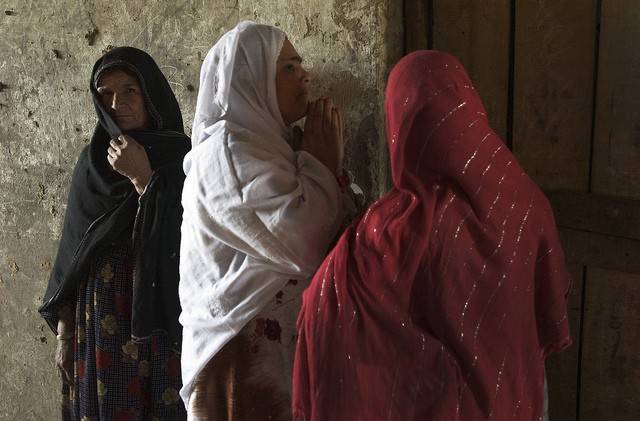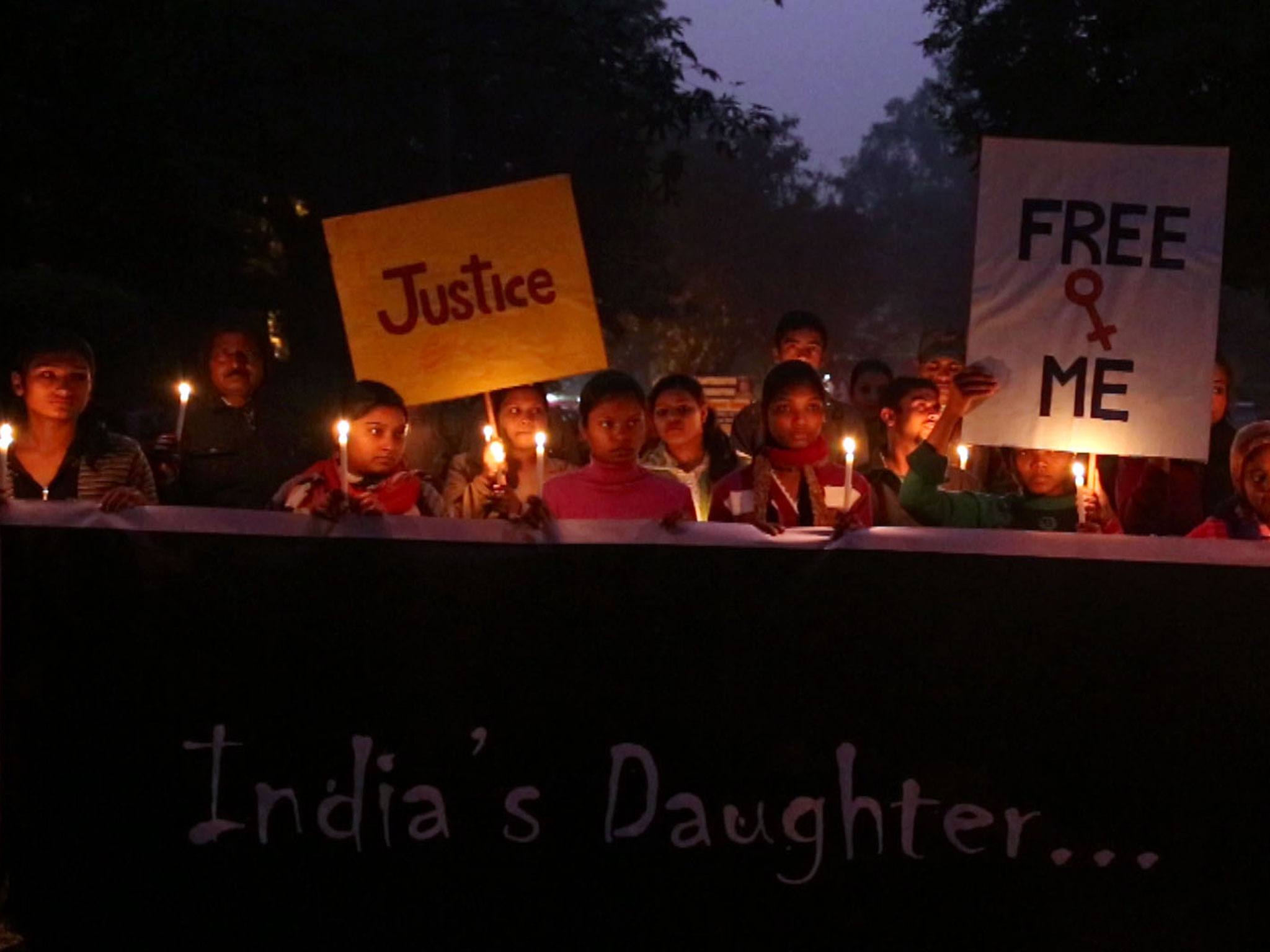Women
Afghanistan: A Country where women have no face and no voice

flickr/un_photo
It is a very discouraging at a time when western forces are moving out of Afghanistan and the relations between the US and Afghanistan is tensed. An aggressive campaign by western human and women rights groups against this new law may actually backfire. The fear looms large that whatever modest gains have been made in the last one decade in the areas of education and women empowerment will erode quickly.
The only ray of hope is that the bill has to be signed by the President. Assessing the ground realities and challenges, he can decide on he would like to tackle a sensitive issues of human rights in his country.
An Afghan research scholar Naysan Adlparvar at Institute of Development Studies, UK, fears that of if the Bill is ratified, it would severely hamper the prosecution of domestic and sexual violence cases committed against Afghan women and girls.
It is a tragedy that Afghanistan suffers from a relatively high number of incidents of child marriage, “honor” killings and the exchange of girls to resolve disputes between families. The harsh reality is that domestic and sexual violence is most often committed by family members and this revised code would make prosecution of such cases near impossible.
Naysan illustrates his point further by saying that the law will ensure that Afghan women and girls would be unable to offer testimony in cases in which they experienced violence or “forced” marriage at the hands of family members. Fathers, mothers, siblings and extended family members – often the only witnesses to physical, sexual and psychological violence – would be unable to give evidence in domestic violence cases. He fears that if the law comes to affect it is also likely that there would be a shift in the perceived effectiveness of Afghan courts. A move away from the formal justice system toward more traditional judicial mechanisms could be expected. Such a drastic shift would a major setback in the legal system reform process in Afghanistan since 2001.
The problem of the informal legal system is that it is largely unregulated and most commonly takes the form of ad hoc consultations between village elders and prominent figures in the community. Meetings of this type tend to favor men over women, the old over the young, and the rich and powerful over the marginalized. It is catastrophic now when violence against women is common and in on rise in Afghanistan and it is estimated that 87% of Afghan women suffer some form of violence over the course of their lives.
The ground reality in Afghanistan is that the geopolitical tension and the rift between USA and the present Afghan President is creating an indecisive ambience thereby reflecting the growing uncertainty surrounding the presence of US forces in Afghanistan after 2014.
President Karzai has increasingly distanced himself from his American counterpart Barack Obama. In the face of widespread domestic consent, he has refused to sign a bilateral security agreement with the US. Instead, he has sought to keep his options open. In an attempt to strengthen his position in a post-NATO Afghanistan he has sought to engage the Taliban and has begun to pander to more conservative elements in Afghan society. These uncertainties have galvanized those opposed to the formal justice system and the empowerment of women. It has also contributed to an environment in which legal protections for women can be more openly challenged. More importantly, however, it will also have a bearing on whether President Karzai chooses to either endorse or out rightly reject the draft that has been passed by the Parliament.
Elsie De Laere, Afghanistan country specialist, Amnesty International USA (AIUSA) stated that they have started an online campaign on the Amnesty International website “President Karzai: Stand up for women’s right to live free from violence in Afghanistan”, requesting President Karzai to reject the new law rolling back violence protections for Afghan Women. She said together with so many other people world-wide, she is very upset with the latest revised draft of the Criminal Code. AIUSA have initiated an urgent action for members and friends which is a letter to President Karzai and the Justice Dept. as well as US President Obama.
Jasbir Singh, a former employee at the Indian Embassy in Afghanistan stationed in Kabul said that there is no law for women in Afghanistan. It is a male dominated society where women are treated worse than slaves and animals. He was shocked to see that women were traded for sheep and other domestic animals. The decades of war has ruined the social fabric of the country, most of the men are unemployed and drug addicts. It will take decades for Afghanistan to transform in a progressive and prosperous country where women are respected and have rights.
Women rights are human rights, but for Afghan women, they are not entitled to human rights. They will have to wait and watch the political developments and geopolitical issues that will unfold in coming days and might shape the future of the country and the women.
Women
Study Shows Women Are Worse Off Long-Term After a Divorce

Divorce has a major impact on the life of every person going through it. And for the first months, this impact is equally strong for both men and women. However, according to a recent study published in Demography, in the long term, the consequences of a divorce are much more detrimental for women.
Why Is Divorce Affecting Women More Strongly?
In the beginning, the impact of divorce is nearly the same for all parties involved because people are going through similar changes and emotional turmoil. Of course, on a personal level, there are many differences and there are many different situations as well. However, in general, at this stage people are focused on working through emotional stress and adjusting to their changed circumstances.
However, those changes, while major, also aren’t as meaningful as they would become with time. The main impact of a divorce, which highlights the gender gap, is economic. Simply put, the difference is that while men regain and even improve their financial position in the majority of cases, women face a high risk of poverty.
In the end, it all boils down to a major loss in household income. While men, statistically, reduce their expenses following a divorce, which means accumulating a fortune over time. Women suffer the exact opposite. Their expenses increase as they need to maintain a household and often care for children. And while the situation with equality in the workplace has improved in recent years, it’s still far from ideal.
As a result, the majority of women earn less money by default, and the situation is even worse for single mothers. Alimony and child support payments are often negligible and do very little to alleviate the chronic financial strain imposed on women by divorce.
What Can Be Done to Change the Situation for the Better?
As long-term financial impact is the major problem, it’s wise to do everything possible to reduce this impact from the very beginning. Therefore, the first thing to do is to cut the cost of the divorce so that both spouses leave the relationship with maximum available assets.
The most effective way to reduce these costs is to forego hiring a lawyer. Today, it’s possible to complete divorce online or use a mediator to get an uncontested divorce. The former option saves the most money while the latter can be used by people who cannot agree but do not want to take their case to court.
Fair division of property is another issue that must be tackled with an eye on the future. However, this matter is extremely sensitive and will be largely guided by the laws of the state. Therefore, the only chance women have to come off better in this is to negotiate the division wisely. It might be better to use assistance from a financial expert when outlining the division plans.
Unfortunately, as the issue of property division is often tied to emotional outbursts, the end result is rarely satisfying for either party.
It’s the same for the matter of alimony and child support payments. Even when they are determined by the court, the payment size is often inadequate and the cases of spouses avoiding these payments are extremely common. However, it’s a fact that enforcing the payment more strictly will go a long way to help alleviate the gender gap in the divorce consequences.
But the most important change that needs to happen in order to reduce the long-term detrimental impact of divorce on women is to ensure they have equal work opportunities and do not have to carry that much of the financial strain caused by a broken household. Unfortunately, the progress in this area is slow. Raising awareness is the first step that could help make a worthwhile change.
Women
So You Want to be a Female Solopreneur: 4 Things You Need to Do First

Becoming a solopreneur is one way that many women create careers that earn them income outside of a traditional employment situation. Solo entrepreneurship is popular and growing. According to The Balance, 41 million people in the United States count themselves as solopreneurs and many of them are making serious money — more than $1.2 trillion for the American economy in just the last year to be exact. This kind of success can happen for you too.
While getting to be self-employed often starts with a dream and a concept, your solopreneur career can also revolve around a unique skill set, but you also need to do a few other things.
Create a Bridge
First, you need to create a bridge. Most women will not be able to quit their jobs and then make enough in self-employment to pay the rent next month. Bridges solve the issue. For some women, they will have enough severance pay or savings to make ends meet until they start to earn enough income to pay the bills. Others will need to take a bridge job — one that involves working fewer hours than you are currently so you have time leftover each day to work on your business.
Build your Brand
Next, you need to build your brand. Writing blog posts, maintaining a social media presence and networking are critical. After all, when you are a solo entrepreneur, you are your business. In general, plan on creating a website and generating some content that is optimized for search engines. You will also need to create a profile on Facebook, Instagram, LinkedIn and Twitter. On these platforms, you have one job — to demonstrate your knowledge about your industry. This content needs to be sharable, relatable, and authentic, and a little visual magic doesn’t hurt.
Buy Better Technology
You will also need to take a look at your technology. You will need a domain name and hosting for your website to start with, but that is just scratching the surface. You are going to need a good computer as well as a variety of different softwares and apps to help you organize your work. Additionally, you are going to need a phone. Solo entrepreneurs are often on the go. You need a mobile phone that can keep up. Look at powerful smartphones like the Apple iPhone 6s. The screen is large enough that you can actually do some work directly from the device, the camera is powerful enough to take photos you can use professionally and Touch ID keeps your phones secure while making it easy to open apps.
Invest in Services
Finally, invest in services. Your iPhone 6s needs to be on a network with a high-quality carrier; dropped calls simply are not professional. You also need to have enough data to actually take care of your business needs, so look for a carrier that doesn’t charge extra fees as your business takes off and your usage increases. Cloud computing services are also important. The right software will capture and categorize your expenses, manage your projects, organize your files and make running your business that much easier.
If you are thinking about becoming a solopreneur, now is the time. Just make sure that you take the right steps to make it happen. Anyone can say that she is in business for herself, but you have to act like you are running a business to be successful. Take the time to plan, prepare and invest in your vision. Your future as a solo entrepreneur depends on it.
India
RSS on Women’s Right: Then and Now – Reforming Indian Conservatives

flickr/vineetradhakrishnan
Not long ago, when RSS mooted the idea of replacing its knickers with trousers, I put forth a conjecture — “If you start dressing like an adult, you start thinking like one.”
Today as I watched an RSS ideologue on prime-time news* waxing eloquent on women’s rights during a discussion on triple talaq, my belief in the validity of the conjecture grew that much more.
Now why do I say that RSS has started acting like an adult (and that it earlier wasn’t)? Time for some history.
Sometime around early 1950s the liberal architects of modern India figured that it is a moral imperative that woman be not treated as second class citizens of India. The constitution of India, of course gave them the equal rights but there were still religious personal laws hiding behind which the various conservatives still propagated patriarchy. To correct this, they brought in the Hindu code bill**. It had the “provisions to allow women to choose their marriage partners, to divorce brutal husbands, and to inherit ancestral property.” (Yes, these basic rights, as they may seem today, were not guaranteed to Hindu women (or any Indian women) from time immemorial.) [Read More: https://en.wikipedia.org/wiki/Hindu_code_bills]
Now RSS, one of the foremost Hindu conservative group, was at the forefront in opposing this bill tooth and nails. Their arguments and opinions at the time, as quoted from Organiser (the official mouthpiece of RSS) were eerily similar to those of All India Muslim Personal Law Board in today’s TV debate.
So, let’s revisit them (and I directly quote Organiser via Ram Guha):
1. “[The Hindu code bill] has nothing Bharatiya about it. The questions like those of marriage and divorce cannot be settled on the American or British model in this country. Marriage, according to Hindu culture and law is a sanskar which cannot be changed even after death and not a ‘contract’ which can be broken any time.” Pretty much the line of reasoning that those opposing triple talaq reforms take today.
2. “[The Hindu Code Bill is] a direct invasion on the faith of the Hindus [and…] its provisions empowering women to divorce is revolting to the Hindu ideology” ~ Organiser, November 2, 1949
3. “We oppose the Hindu Code Bill. We oppose it because it is a derogatory measure based on alien and immoral principles. It is not a Hindu Code Bill. It is anything but Hindu. We condemn it because it is a cruel and ignorant libel on Hindu laws, Hindu culture and Hindu dharma” ~ Organiser, December 7, 1949
4. “Rishi Ambedkar and Maharishi Nehru would atomise society and infect every family with scandal, suspicion and vice” ~ Organiser, December 7, 1949
Yes, that’s right — they thought that a woman getting an equal right in inheritance or right to choose her husband or right to divorce would “infect every family with scandal, suspicion and vice”. I think, now 60 years after the adoption of those bills, we can agree that lot of those assertions were mere exaggerations by the conservative patriarchs to protect patriarchy.
So just keep this history in mind as you see and hear various Maulanas hide behind religious customs to protect patriarchy. And remember — adjusting for the standard of women’s right in India, the only reason why Hindu women are a bit ahead of their Muslim counterparts is because the that early architects of modern India happened to be some liberal with a spine.
So, as I watch the khaki pants argue for women’s right, I cannot but feel glad for their change of stance.
But as Guha says — “Organisations, like individuals, have a right to change their minds. But any such change of view must be accompanied by a frank and open reckoning with why and how it happened.”
So, till the time I am clear how this new-found concern for Indian women came about, my support to this government and its ideological mentors will obviously of case specific.
[polldaddy poll=9578409]
-

 Business11 months ago
Business11 months agoHow To Future-Proof Your Business With The Right Tools
-

 Travel9 months ago
Travel9 months agoTravelling from San Antonio to Guadalajara
-

 Business12 months ago
Business12 months agoWhat are EDC products, and why should you always have them?
-

 Travel6 months ago
Travel6 months agoTravel wellness tips for a healthier and more enjoyable journey
-

 Europe4 months ago
Europe4 months agoRecent Books by Boaventura de Sousa Santos: Law, Colonialism, and the Future of Europe







